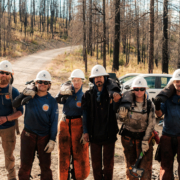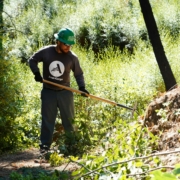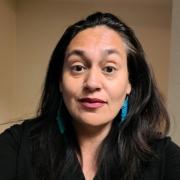Edited by Hannah Traverse
At the end of April, approximately $400 million in AmeriCorps grants were terminated, impacting more than 1,000 organizations across the country. Upwards of 32,000 AmeriCorps positions were cut. Maryland Conservation Corps (MCC), operated through the Maryland Department of Natural Resources, was one of the more than 20 organizations in The Corps Network’s membership that lost AmeriCorps funding.
Though they could no longer serve as AmeriCorps members, roughly half of the 41 MCC members who lost their positions decided to continue serving the parks as unpaid volunteers. The Corps Network was inspired by their dedication to give back and get work done. We spoke with several MCC members in May. Since these conversations were recorded, the Corps was able to use non-AmeriCorps funds to reinstate all MCC members who wished to return. Please read our exchange below with Carly Brukiewa, an MCC member from Assateague State Park who continued her service despite the AmeriCorps cuts. Carly recently transitioned from her MCC position to a seasonal naturalist position at Assateague State Park.
Background Information:
Name: Carly Brukiewa
Park: Assateague State Park (Eastern Maryland)
Background: Carly is originally from Glen Burnie, MD, just south of Baltimore. She served her first term with MCC from September 2022 to August 2023. She then completed a seasonal position at Shenandoah National Park through Conservation Legacy and the Scientists in Parks program. She rejoined Maryland Conservation Corps in September 2024.
Q&A
What made you decide to join MCC? Did you have outdoor experience? Had you done similar programs in the past, or did you study conservation in school?
In college, I majored in environmental science, and I minored in history; I had an idea that I was interested in working in parks. For my college, you had to do a capstone – an internship or a work study in your chosen field. I did mine with Patapsco Valley State Park. I worked a season there, mostly doing similar work to their seasonal rangers; so, day-to-day park operations. I really enjoyed it. Some of the other seasonal workers were planning to join MCC at the end of the summer; I couldn’t join then because I was still finishing school. I finished college and did another season at Patapsco Valley State Park, but I was looking to do more. I knew people in MCC and they encouraged me to apply.
I hoped to come out to Assateague; luckily, I was chosen here because I’m really interested in environmental education. My mom is a teacher. I was raised around this kind of stuff. I think that education is the most valuable way we can get people to appreciate and enjoy the environment.

Carly with an owl. Raptors that can not be released to the wild are cared for by MCC members. The owls participate in educational lectures.
Tell me about your day-to-day. What was your role in MCC?
Oh, gosh! We do so many things. But here at Assateague, and specifically this time of year, we do quite a bit of environmental education and other interpretive work. We go to schools and teach lessons to children. We’re also getting ready to start our field trip season, where many local schools and community groups come to the park and we do environmental education for them.
Another main duty at Assateague is animal care. Maryland Park Service has a program called Scales and Tales, which is where they take in non-releasable animals that are native to Maryland and use them for education. We have a collection of reptiles, raptors, and some aquatic animals. We feed them, change water in tanks, and do other tasks.
In addition to that, we do park improvement projects, we maintain trails…we travel across the state and do other kinds of projects – it can be chainsaw work, trail building, invasive species removal…
What was your reaction to learning about the AmeriCorps cuts?
I was very shocked. I mean, obviously I knew things like this had been happening, but I thought we would be safe at least for this year, that we would be able push through the last couple months of our term. I never thought something would happen to us now.
When I first learned about it, it was just like, “Oh, wow! That is not great.” And then it kind of hit me. And I started to think about all the things that my crew does, and all the things that we’re relied upon for. I was obviously a little worried for myself – it’s not so great to lose something that you’re counting on. But MCC does a lot for the park service, and consequently the public. All these kids that are supposed to come for field trips – is that still going to happen? All the summer programs we were supposed to participate in…all the events we were supposed to plan…is any of that still going to happen without MCC? The Park Service is resilient, but to cut 41 people suddenly – that’s a lot to cope with. So, I thought about myself. But I really thought about the consequences this is going to have for the Park Service and the public.
I smile because you know, what else can I do? I had my cry when I first found out – everyone should get to feel their feelings – but me being upset now doesn’t help anything. All I can do is push through in this moment and do what I can to help MCC.

Interpretive work is an important responsibility for many MCC members.
What has happened since you found out your AmeriCorps position had been terminated?
When we found out, the next day we had a large annual event planned, and my first reaction was, “Well, I’m still going to come. I’m still going to volunteer my time.” I’d been working hard for this event to happen, and I’ve been looking forward to it and, in a way, I was like, “Well, I’m not gonna let them take that from me, too.”
So, me and several of my crewmembers all volunteered the next day, and it was nice to just be around each other. Since then, I took a few days. And then, I said. You know, if you guys want me to volunteer while we’re waiting*, the other option is to sit around and wait, and that feels worse than anything.
So, I’ve been volunteering. It’s field trip season, so mostly for things related to that, or things like animal care – daily tasks that we would be doing otherwise. The park can try to find people to cover, but then it puts so much more work on rangers and other park staff who are kind of already overburdened. While I’m here and I’m kind of waiting for something to happen, I might as well help out.
Fortunately, on my own personal behalf, since it was my second year of MCC and my third AmeriCorps program, I knew I wasn’t going to be doing another year of MCC after this, so I had applied for seasonal work. I was fortunately hired for a contract that would have started after my MCC graduation. Until there are other answers, the hope is to possibly get that moved up so that I would still be here at Assateague and doing very similar work.
So, I’m just trying to stay busy and help out. You know, we live here on the park premises – that was one of the things that was supplied to us by MCC. Members receive low-cost housing at the park. They’ve been kind enough to let us ride it out in our park housing for the time-being while they figure things out. I can’t imagine just living here and looking out the window and watching people do the work that I was supposed to be doing. I can at least be of some help, because I love my job – it’s not just work
*Following the cuts, MCC members were let go while the park worked to find alternative funding to re-engage them in the program. MCC has since secured the funding to be able to reinstate members.

Carly planting native species.
You touched on this, but you can talk a bit about what motivates you to keep going?
Well, part of it is that I really love my job. I’m really passionate about the environment and environmental education. My dream is to work for the Park Service in a full-time capacity one day. For the better part of the last four years, I’ve been working for the Park Service, so I feel very entrenched in the Maryland Park Service community. And you know, while I’m struggling with this very sudden departure from what I was expecting to happen for the end of my AmeriCorps term, it’s really hard for me to watch this community that I’ve been in also struggle. It’s affecting the AmeriCorps members, but it’s also affecting the Park Service. It’s going to affect our local communities.
I’m fortunate to be able to stay and help. I don’t see how I can’t. I care about the community, and I care about doing what I’m doing. And I’ve been so looking forward to doing all these things… for field trip season and for the summer, and to be excited for it all year, and then have it taken. Again, it’s that thought of, “They can’t take this from me, too.”
What would you say is the mood among your fellow MCC members now?
I think it’s shifting as time goes on. When it first happened, it was obviously quite shocking and somber. Then there was a sense of rallying around. We might not be able to serve in AmeriCorps, but we’ve spent the last seven months working and living and serving together. If we aren’t AmeriCorps members anymore, that doesn’t mean we can’t maintain that community.
Sadly, not everyone is fortunate to be able to wait for weeks for more news. People are starting to look at what their options are, but many of my fellow Conservation Corps members are volunteering because they feel like I do. They made commitments to events, to the parks, to communities. Overall, there’s a feeling that we’re all in this together. These are really motivated individuals.
What would you tell people who don’t know much about AmeriCorps? What would you want them to understand?
We’re often thanked by members of the public for our service. And it used to be something I really hated because that’s something you say to military service members, and it feels awkward. And to me, this never really felt like a chore. In the past, people used to say thank you with a lot of joy and happiness, but in the past three months, people say it with a sense of pity or fear in their eyes. Now that this opportunity to serve our communities has been taken away, I can see what they saw.
I think AmeriCorps is one of the truest ways that we can serve our country. Obviously excluding the military, but it’s a way to serve our communities right where we grew up, or communities across the country where we didn’t grow up. We are directly serving our communities, not for the money – we make a living stipend – but for nothing more than love and care for the communities that we work in. To anyone who thinks AmeriCorps is a waste, I would tell them to please meet an AmeriCorps member and ask them why they do what they do. It’s not to get rich, and it’s not just ‘because I need a job.’ It’s because they have a genuine passion for serving people and the community.

























































































